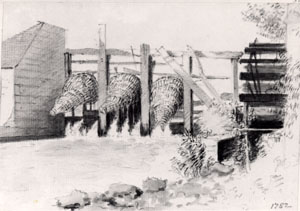|
|
Web Hosting by Netfirms | Free Domain Names by Netfirms |
|
|
|
|
Hotspot
3. The Site of Iffley Watermill.
|
|
See Perrott, J., Iffley Water
Mill, a History. ILHS Publication No 3.
|
 |
|
Iffley Mill
wheel, weir and eel-bucks (traps), 1782
|
|
|
|
Iffley Mill,
Henry Taunt,1862. Centre for Oxfordshire Studies.
|
|
|
|
Iffley Mill
© The Werner Company of Chicago, 1894, Page 173
|
|
|
|
Iffley Mill
from lock and boat slide c1900, Taunt, (see lock diagram in Hotspot 1.
River)
|
|
|
|
Iffley Mill,
1903-1905, Henry Taunt.
|
|
|
|
'Fire at Iffley
Mill, Oxford, May 20th 1908.'
|
|
|
|
|